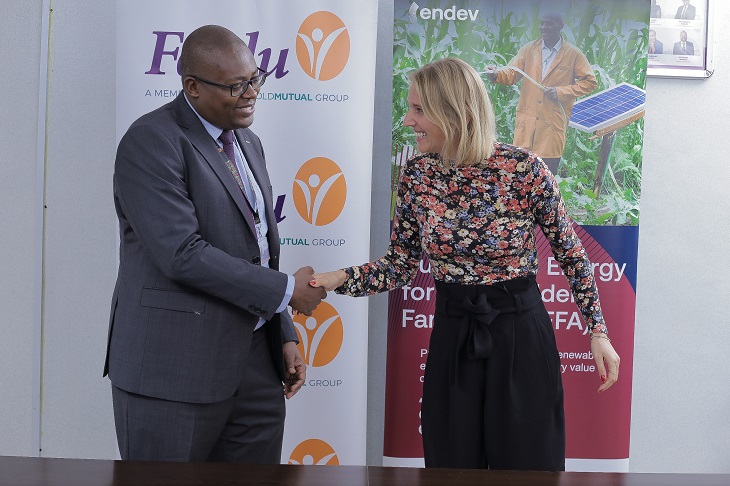Smallholder Farmers in the dairy and horticulture value chains in Kenya can now access green financing from Faulu Microfinance Bank.
This follows the signing of a partnership between the bank and Deutsche Gesellschaft für Internationale Zusammenarbeit (GIZ) as part of the Sustainable Energy for Smallholder Farmers project being implemented in Ethiopia, Kenya, and Uganda.
The Bank aims at disbursing KES120 million during the pilot phase to about 400 individuals in at least 6 counties (Kirinyaga, Meru, Muranga, Nakuru, Machakos, and Makueni) for investment in Solar powered irrigation, solar-powered cooling, and solar drying among other solar technologies.
Commenting on the partnership, Faulu Acting Chief Executive Officer Julius Ouma said, “We are more than happy to partner with GIZ in empowering our traders and farmers across the country. Because of this project, we will support smallholder farmers in accessing and using solar energy to improve their livelihoods and increase their resilience to climate change. We also hope that our support will increase their productivity and economic competitiveness.”
The project aims to support the demonstration and scaling up of innovative and market-based business cases using renewable energy technologies for cooling, irrigation, and drying targeting MSMEs in agricultural value chains.
To be implemented in four phases, the project’s pilot phase will see Faulu Bank determine the financing needs of smallholder farmers for solar-powered appliances and equipment and develop appropriate financial products. The bank will also identify reputable distributor partners for the relevant solutions and, build capacity for both staff and potential customers.
Through this partnership, Faulu and GIZ are set to invest KES 15.2 million towards capacity building and promotion of a green financing portfolio set to benefit at least 400 farmers whom the bank looks to fund to acquire solar water pumps and other related solar-powered technologies. Currently, the majority of smallholder farmers use petrol- or diesel-powered engines to pump water for irrigation or watering livestock. These are expensive to run and maintain and also release Greenhouse Gas (GHG) emissions to the environment.
“Through the provision of green financing solutions, this partnership will unlock access to modern renewable energy technologies and climate-smart practices that improve farmers’ livelihoods, greenhouse gas emissions are reduced and their farming activities become resilient to climate change.” Valerie Ostheimer, Project Leader GIZ- EnDev Kenya.
According to a recent Efficiency for Access report by Endev and the IKEA foundation that analyses the use and Impact of Solar Water Pumps, at least 58 percent of customers who use solar-powered pumps report significant improvement in their quality of life since they begin relying on solar technology for irrigation. More specifically, 87 percent reported an improvement in their way of farming, and there were also widespread reports of improvement in confidence, production, and increased earnings.
Over the last decade, the use of Renewable energy has grown rapidly, especially for household lighting and large-scale application. However, low awareness and low affordability by target end users along with limited consumer financing options are key constraints to adoption, especially in important economic sectors such as agriculture and informal trading.
With Kenya being an agriculturally based economy, predominantly characterized by subsistence farming practiced mainly by low-income smallholder farmers, the adoption of renewable energy technologies will result in a far-reaching impact on the sector.

